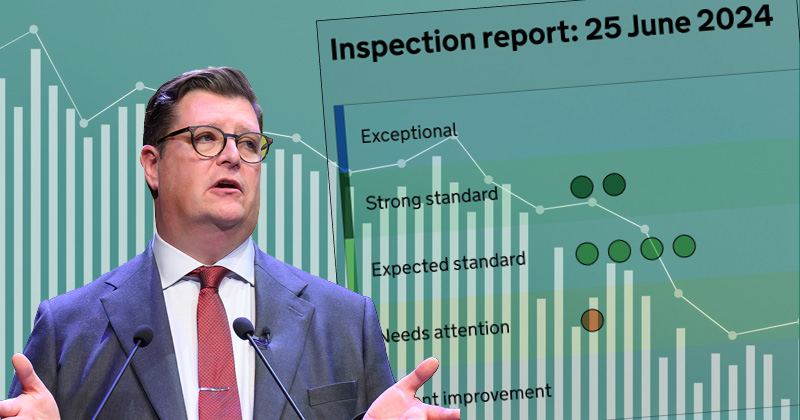School leaders who volunteered for new Ofsted inspections said they were much more collaborative, but warned about the toll on staff of the “far more rigorous” checks.
New report card inspections were introduced last week, with routine inspections restarting on December 1.
Currently, inspections are only for schools who volunteered and are led by senior inspectors. But here’s what five leaders who were inspected had to say about their experience…
Collaborative, but rigorous
Leaders said the inspections are “more collaborative”, with a “definite shift in tone”.
One leader said inspectors praised what the school was doing well and added they were “a lot more open”.
However, he warned of heightened pressure on staff, saying the inspection was much more rigorous.
Staff described “a level of pressure that is way heavier than anything they have seen beforehand”, he said, adding it was “an awful lot of scrutiny, at a granular level, that schools aren’t used to”.

One newly qualified teacher was observed “for the best part of two-and-a-half hours during the two days, which is way more than anything you would have ever expected under the old framework”.
Paul Stone, CEO at Discovery Trust, took part in an inspection at one of the trust’s primary schools last week. He said the inspection, which involved four HMIs on day one and three on day two, was “incredibly intense”.
While inspectors were “very caring and very clear”, the new framework is “massively different” and could shock schools, he warned.
Concerns about ‘secure fit’ model
Headline grades were abolished in September 2024. Under the new framework, schools are instead graded on a colour-coded, five-point scale across a minimum of six judgment areas.
To achieve a set grade under Ofsted’s new “secure fit” model, every standard must be hit, which is a shift from the previous “best-fit” model of awarding ratings.
Inspectors begin by assessing whether a school meets the requirements for the middle ‘expected standard’ grade.
Stone said this approach leaves “no wriggle room”. Meeting every ‘expected standard’ is “going to be hard for schools”, the head of the inspected school added.
Concerns also centre on the ‘achievement’ judgment area. To reach ‘expected standard’, pupils must “achieve well” and have attainment and progress scores “broadly in line with national averages”.
Two leaders pointed out that this use of averages means “half of schools simply won’t meet it”. One added that terms like “typically” and “generally” in inspection toolkits also leave too much to inspector interpretation.
Another leader said the sheer number of requirements in the toolkits makes the pre-inspection self-evaluation process and evidence gathering extremely time-consuming.
While another said: “[With] everything that’s going on in schools… I really, worry about staff, recruitment and retention.”
Although he felt the provisional grades his school received were fair, he cautioned: “You can’t boil a school down to a load of boxes and some colours.”
Tough grade benchmarks
Stone said his school received fewer higher grades than he had expected.
Another leader described ‘expected standard’ as “a very tough benchmark”, and ‘strong standard’ as “a very high benchmark indeed”.
“I would say ‘exceptional’ is quite a bit beyond ‘outstanding’ – quite significantly so,” he said, predicting some ‘outstanding’ schools would not even achieve one.
Another said the ‘exceptional’ grade “is going to truly embrace its name, in that you will need to be the exception to the rule to achieve that”.
He added that many schools will be “far more likely to get a range of grades”.
Stone said he was concerned that even “savvy parents will not understand”.
He said ‘needs attention’ could be interpreted as “terrible”, while moving from ‘good’ to ‘expected standard’ could appear “like you have gone backwards”.
Ofsted has stressed that the new grading system is not comparable to the previous one.
But one leader said: “Regardless of the narrative, people will be able to draw parallels between the frameworks, the same way that they did with the GCSE grading structures.”
Ofsted’s national director for education, Lee Owston, said this week that the inspectorate is working to produce materials for parents to explain the new grading system.
‘Go anywhere in the building’
One CEO described their inspection as more “fluid” and “on-the-hoof”, compared to “structured” meetings for subject deep dives.
“It was basically very much kind of ‘go anywhere in the building … follow children rather than follow subjects’, and ‘we’re going to see what we find in that way’,” he said.
Another leader said inspectors “talk[ed] to children a lot more, and not necessarily [only] in the same structured way that they have previously”, testing schools’ claims against pupils’ real experiences.
Leaders remarked on the new framework’s “huge focus on inclusion” – which includes an ‘inclusion’ judgment area.
They reported inspectors doing detailed case sampling of around six children who face disadvantage or barriers to their learning.
Stone said inspectors also looked at how teaching was being adapted to fit disadvantaged children, and welcomed the inclusion focus as “long overdue”.
But he added that heads not well supported by a trust or local authority could find the new inspections “very difficult”.
The primary head added: “If you know the needs of your pupils and you know your school, it would be a fairly positive process. But there is absolutely no hiding away from anything.”
‘Energised not anxious’
Chief inspector Sir Martyn Oliver said the new “learning walks” had “felt much more natural and more representative of the normal school life, and there’s been an emphasis of the approachability of inspectors.
“When we inspect, we are asking you to take us on a journey around your school. Tell us your story.
“Inspection is a chance for a dialogue and a genuinely collaborative process in which we are thinking together about what we are seeing.”
Speaking at the Schools and Academies Show at the NEC in Birmingham on Wednesday, he said he wanted leaders to “feel comfortable and motivated by the changes”.
“Not anxious, but energised by a system that accounts for the complexity and richness of what happens in your schools every single day.
“And it should feel energising. This is truly a bold, defining change that fundamentally reshapes how we think about schools, and hopefully, how you all think about yourselves.”
He added that Ofsted had “done all that we can” to ensure reform is “done with you and not to you”.
He insisted that “teacher and leader wellbeing is built into the very aspect of how I designed this renewed approach.
“Your workload matters. Your stress levels, as we’ve seen today, matter. The sustainability of your leadership matters.”
















It was lauded as an inspection framework which would benchmark schools against similar schools and take context into account. It doesn’t. The fastidious and pedantic approach to the grade criteria by inspectors means that schools in disadvantaged areas will fall. It says national average in the EYFS section for strong standard and inspectors applied this to the letter despite a school with breathtaking progress from starting points – this was ignored by inspectors. A school in the pilot, primary where parents are the ones sending children to school, was almost judged as needing improvement despite it being the highest attendance in the south of the city. The grade description said average regardless of context – so this is how inspectors applied it. at no time is context taken into account at the judgement meetings
No surprise.
Ofsted tasked with reducing stress for teachers increases workload and stress.
And we wonder why staff hate their jobs and regularly leave in 5 years.
Don’t get me started on the effect these bureaucrats have on leaders.
How can it be more pressure …they spent all that time listening